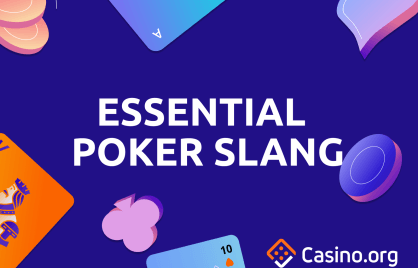What Are The Odds of Winning The Lottery & Why Do People Still Do It?
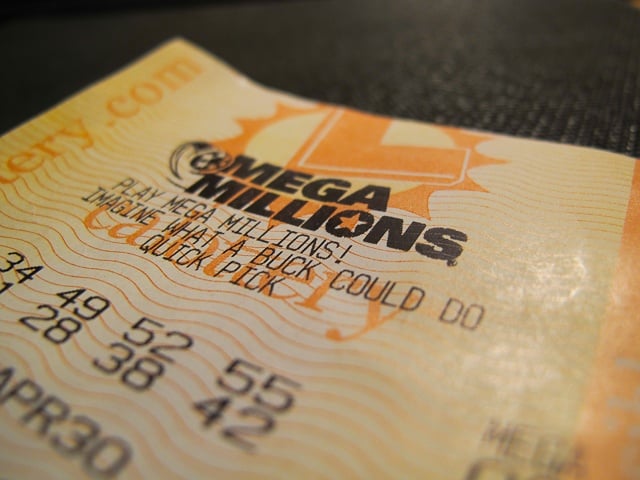
Summarize this post
The odds of winning the top prize in some of the most popular lotteries range from 1 in 302,575,350 to 1 in 13,983,816. Or in other words, very close to zero. And yet, it is still one of the most popular and respected games of chance.
In this article, you will see what the odds of winning the lottery are, why they are so low, whether you can increase them (and how), as well as why people continue to play.
What Are The Odds Of Winning The Lottery?
The odds of winning the lottery depend on each lottery design, but are usually one in millions, tens of millions, or even hundreds of millions.
The probability of winning a prize in a given lottery is the ratio between the number of combinations eligible for that prize, and the total number of possible combinations from all of the lottery numbers.
In most of the lotteries, winning the highest prize or the jackpot assumes hitting all the numbers in the draw, which forms one single combination. Therefore, the probability of winning the top prize is usually the easiest to work out: it is one in the total number of possible combinations.
In math terms, the odds of winning a prize in a lottery is a “combinatorial probability”.
Almost all state lotteries actually display odds charts on their sites. But for now, let’s see what the odds of winning three of the most popular lotteries are: 6 from 49, Mega Millions, and Powerball.
Odds Of Winning The 6 From 49 Lottery: 1 in 13,983,816
In this lottery, 6 numbers are drawn from 49, and a line to play consists of six numbers. To win the top prize, a player must hit all the six numbers in their line.
Since the number of all possible number combinations is 13,983,816, the probability of winning the top prize with one played line is 1 in 13,983,816. This latter number is nearly the population of Rwanda. Winning the top prize is like picking one given person in this population blind-folded.
For the second category of prizes (five numbers hit out of six) the probability changes to 1 in 54,201, which is still very low. This is the equivalent to being randomly picked from the crowd of a full and large stadium.
For the third category of prizes (four numbers hit out of six), the probability is 1 in 1,032. Comparing to the previous ones, it may seem a decent probability, but it’s actually still low – it’s like someone opening the Miriam-Webster dictionary for you, and you correctly guessing the page they opened it to, without seeing the action.
Odds Of Winning The Mega Millions Lottery: 1 in 302,575,350
In the Mega Millions lottery, the numbers are drawn from two separate pools – five numbers from 1 to 70 (the white balls) and one number from 1 to 25 (the gold Mega Ball). You win the jackpot if you hit all six numbers drawn.
The white numbers can be combined in 12,103,014 different ways. Multiplying this number with 25 (the number of possibilities for the gold ball), we get 302,575,350 possible number combinations for the entire draw – an astronomical number! In kilometers, this is almost twice the distance from the Earth to the Sun.
The probability of winning the jackpot is very close to zero: 1 in 302,575,350. If we write this fraction as a decimal number, we can see eight zeroes after the decimal point: 0.000000003304961.
The odds for the next categories of prizes are much higher than for the jackpot, but still very low:
- 1 in 12,607,306 for the second category (hitting five white numbers)
- 1 in 931,001 for the third category (hitting four white numbers and the gold ball)
- 1 in 38,792 for the fourth category (hitting four white numbers)
Odds Of Winning The Powerball Lottery Jackpot: 1 in 292,201,338
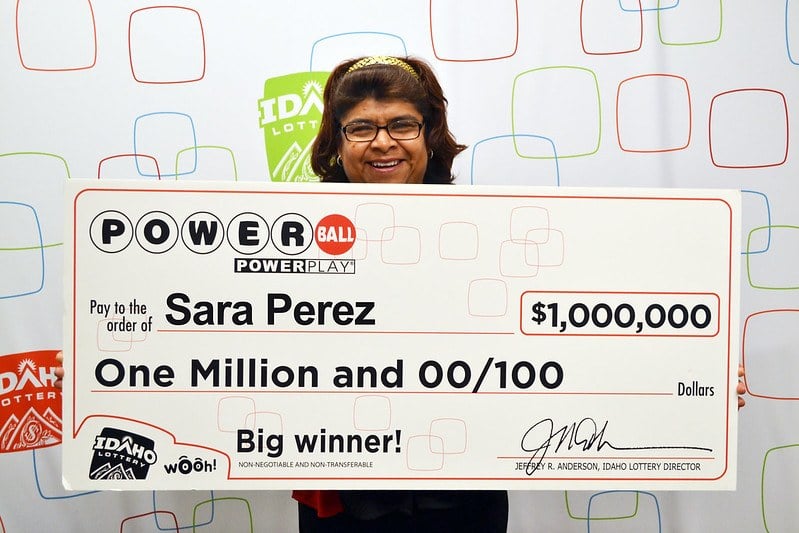
The Powerball lottery is very similar to the Mega Millions lottery in terms of structure, rules, prize categories, and the odds of winning. There are five white numbers to be drawn from 1 to 69 and one (red) Powerball number from 1 to 26.
The Grand Prize (for hitting all six numbers) has a probability of winning of 1 in 292,201,338.
- The second-category prize (for all five white balls hit) has a 1 in 11,688,053 probability.
- The third-category prize (four white numbers and the red number) has 1 in 913,129.
- The fourth-category prize has 1 in 36,525 probability.
The Odds Of Winning The Lottery Visualized
Those with a sense of numbers may qualify the odds of winning the lottery (either the jackpot or even the near-winning categories) as very low or close enough to zero. But for most people, understanding the probability of winning the lottery is a matter of perception.
The best way to form an objective perception is by comparing the odds of winning a lottery to the odds of other rare events or phenomena in daily life.
The Odds Of Getting Struck By Lightning vs Winning The Lottery

According to the US National Weather Service, the odds of someone being struck by lightning in an 80-year lifetime are 1 in 15,300.
That’s about 19,100 times higher (more likely) than the odds of winning the Powerball’s Grand Prize, with one played line in a given draw.
The Odds Of Being Hit By A Meteorite vs Winning The Lottery
Or take the event of being hit by cosmic objects: According to earth sciences Professor Stephen A. Nelson from Tulane University, the odds of someone being hit by a meteorite, asteroid, or comet during their lifetime are 1 in 1,600,000.
That’s about 20 times higher than the odds of winning the Mega Millions jackpot.
The Odds Of A Shark Attack vs Winning The Lottery
Perhaps one of the most unwanted deadly events, a shark attack during one’s lifetime is estimated by the International Shark Attack File to have 1 in 11.5 millions odds.
The Odds Of A Plane Crash vs Winning The Lottery
Or, take a more domestic example such as a flight. A Harvard University study cited by The New York Times estimated the odds that your airplane will crash are 1 in 1.2 million.
This is about 12 times higher than the odds of winning the 6 from 49 lottery with a one-line ticket.
Note: These odds estimations are “statistical-average extrapolations” rather than accurate probabilities – such events or phenomena cannot be accurately quantified given the multitude of physical factors involved. However, these figures are very relevant when it comes to perceiving the mathematical probability of winning the lottery, as they can be interpreted in terms of “real happenings” and physical possibilities.
Why Are The Odds Of Winning The Lottery So Low?
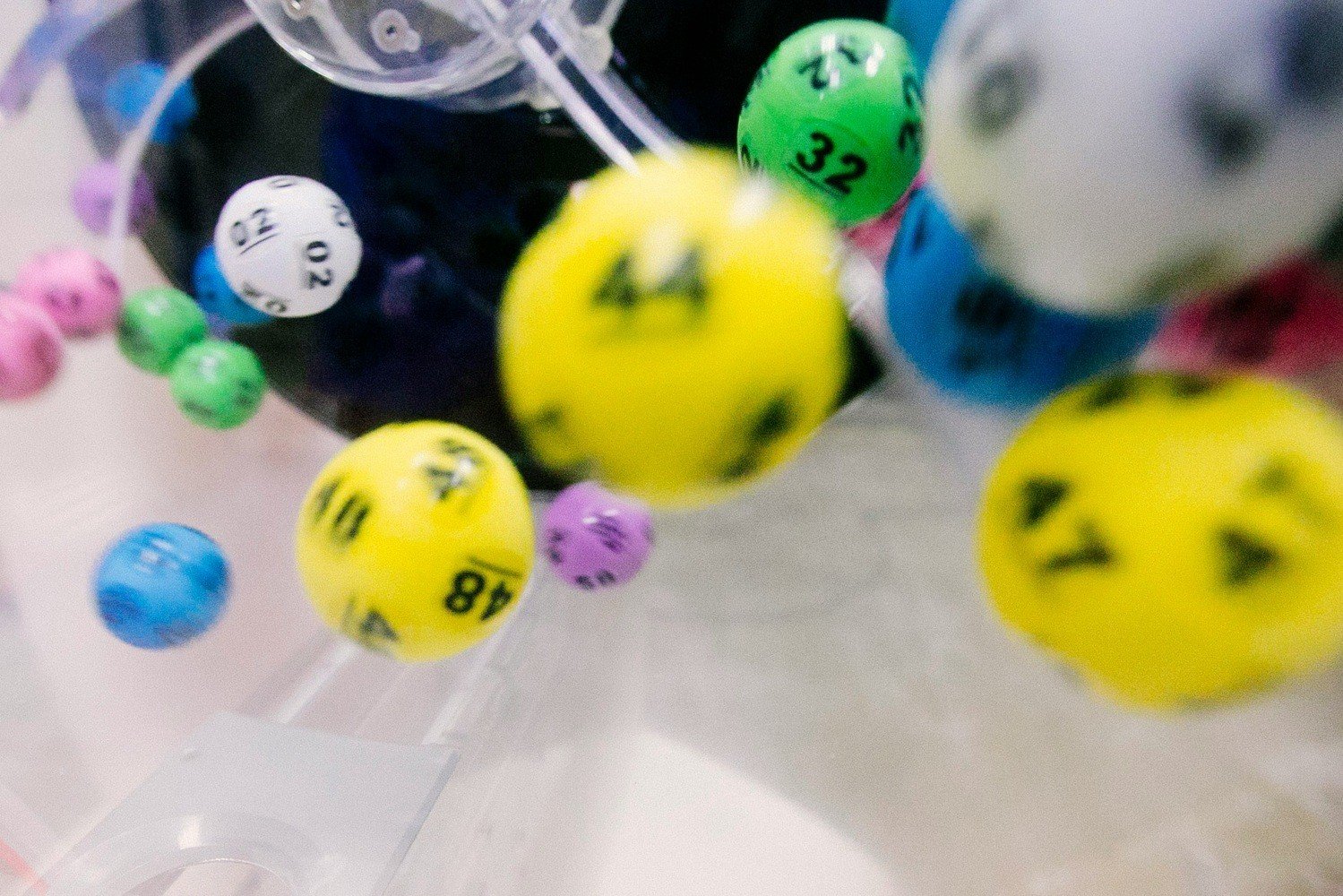
The odds of winning the lottery are so low because of the multiplication power of combinations.
For instance, the number of permutations (possible ways in which a number of things can be arranged) of 4 objects is 1×2×3×4 = 24. With 5 objects, it jumps to 120 (1×2×3×4×5). Then for 10 numbers, it reaches 3,628,800.
These types of multiplications (called factorials) are how we work out the number of combinations of a given number of objects (numbers/balls, in our case). They then get multiplied by other factors and increase the value of the final result. What is important to remember is that the higher the number of possible combinations, the lower the probability of hitting one in a draw.
The parameters of lottery designs as numbers are not that big: 40, 50, 60, or 70 numbers to draw from and 3, 4, 5, 6, or 7 numbers drawn. When someone sees these small numbers and doesn’t know about the power of combinations, it can be difficult for them to understand how to get to that huge number of 1 in millions, tens of millions, or hundreds of millions.
The Odds Of Winning The Lottery Twice
You may fairly ask: If the odds of winning the lottery at a given draw are so low, how low are the odds of winning it twice?
Of course, the answer depends on a variety of factors, such as the kind of win and the number of draws that take place.
If we take the probability of two wins in two draws, it is simply the square of the probability of a win in a draw. For instance, winning the fourth-category prize in the Powerball lottery (having the probability 1 in 36,525) twice in two given draws has the probability 1 in 1,334,076,859.
If the number of draws or of wins is larger than two, the probability changes. Let’s take a few examples:
- Winning it twice over 1,000 draws gets a probability of about 1 in 2,778
- Winning it twice over 5,000 draws gets a probability of about 1 in 122
- Winning it three times over 5,000 draws gets a probability of about 1 in 2,702
Despite the low odds, there are players who have won the lottery more than once, and this was not always down to pure luck, as we will see in a next section…
Can You Increase Your Chances Of Winning A Lottery?
The straight answer is ‘yes’, but the only way to increase your odds of winning the lottery is to play as many lines as possible per draw.
That’s because any two combinations of numbers have the same chance of winning, even if they share some numbers. For example, [2, 5, 27, 32, 45, 46] has the same probability as [1, 5, 27, 35, 40, 41].
This is the reason why any elaborate playing strategy (including those based on number selection) is not worth the analysis. Their effectiveness simply comes down to the number of lines played.
Is It Worth Investing?
The downside of such a strategy (if we can call it a strategy at all) is that you would need to play such a large number of lines to increase the probability of winning by a decent amount. It would turn into a serious investment with a high risk. You could end up in winning in one or several categories of prizes that would make your overall prize lower than your investment.
For instance, say you buy 1,000 lines on your tickets at the 6 from 49 lottery, which would cost around $1,000 or more. By doing so, you are increasing your odds to 1 in 13,984 for the top prize, 1 in 54 for the second-category prize and to almost 1 (that is, a sure event) for the third-category prize.
The first two probabilities remain low, and you are likely to win one or more prizes in the third category, which may not cover your investment.
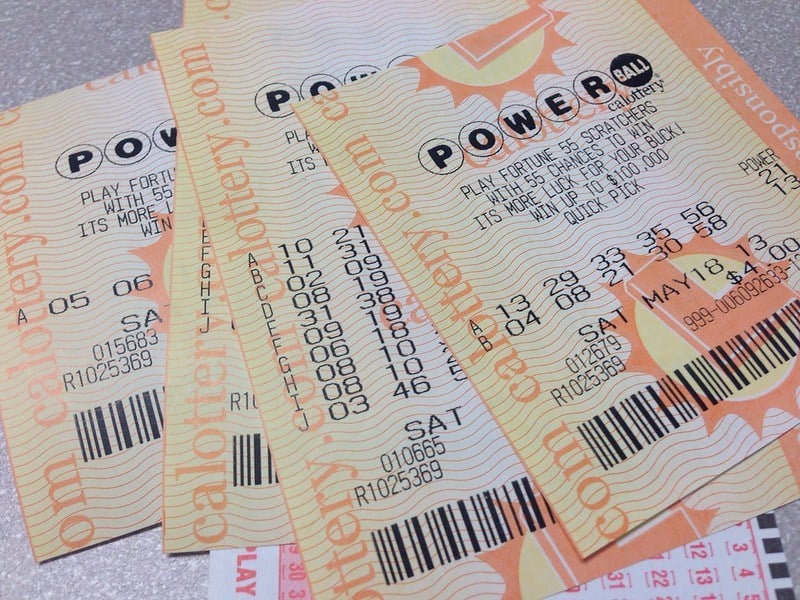
But It Has Been Done
And yet, several players have won the lottery more than once. For a few of them, it was a matter of pure luck, but for most, it was due to an elaborate plan.
The unbeaten record is that of the Romanian mathematician Stefan Mandel, who won 14 different lotteries.
His plan was not based on any scheme of choosing numbers or combinations, but to cover as many combinations of numbers as possible. The only feasible way to do that was to work in a team. This way, the investment and the risk was shared, even though the win would be split between the players.
With this plan, the toughest task is to convince enough investors to join. But even then, it’s a logistical nightmare. It requires identifying the lotteries with the best odds, using algorithms to generate the combinations, checking the jackpots regularly, getting in on the action at the right time etc.
But Mandel succeeded and became a millionaire. He was subsequently investigated by the FBI, who found him clean.
Playing in a team is the only reasonable way to increase your chances of winning with the lowest risk. However, the risk still exists. The lottery will always be a game of chance where the house always wins.
Lucky Numbers And Curious Lottery Draws
Many people who play the lottery use “lucky” numbers that have significance in their lives. For example, numbers representing birthdays of their family members. They may also avoid certain numbers or combinations, such as lines with consecutive numbers, thinking that these combinations are very unlikely to be drawn.
Would you play the line 1, 2, 3, 4, 5, 6 in a lottery? If not, why?
If you were to play a particular line that the majority of players avoid, and that line ends up winning, you would receive a larger prize, because the prize fund would be divided among fewer winners. That’s an objective reason for playing that line, not avoiding it!
In June 2022, seven consecutive numbers occurred at a Virginia Lottery draw in the US (13, 14, 15, 16, 17, 18, and 19). The odds of that particular combination being drawn are about 1 in 3.8 million, but the same odds apply to any other combination.
The event exploded in the news as a “crazy draw”. I was interviewed by The Washington Post about this draw and told them that such event is not amazing from a probabilistic perspective, but rather from a regular lottery player’s perspective. Players can see that any outcome is possible. Such a draw will perhaps occur again in the next one hundreds of years or more.
The lottery is the simplest game of chance. As long as any combination has the same probability of being drawn, there is no real strategy for choosing numbers.
Why Do People Still Play The Lottery?
A player playing one line in the 6 from 49 lottery regularly, will have to play 13,983,816 times to expect a big win. This would mean playing for about 291,392 years (with one draw weekly).
Even assuming the player plays 100 independent lines each time to enhance the probability of winning (which would be costly), they would still have to wait about 2,914 years for a win.
Of course, this estimation is made in terms of statistical averages and not actual possibility, but it is a relevant model of objectively perceiving the odds of winning the lottery. So, why do people still play the lottery against the minute odds of winning? Or, why don’t people try other forms of gambling games with better odds?
Most psychologists explain this behavior like they would for a general case of problem gambling – overestimation and misperception of odds, the availability bias, the gambler’s fallacy, the sunk-cost fallacy, the illusion of control, and the near-miss effect.
Among these factors, the availability bias is particularly relevant for the lottery.
The Availability Bias
Lottery winners with “mind-blowing” wins are heavily publicized, which may cause you to overestimate your own likelihood of winning (“If they succeeded, so can I”).

However, the existence of a winner does not indicate any good odds, but just that the game is so popular that people usually buy enough tickets together to cover the winning combination, whatever that will be, or at least a big share of the possible combinations.
However, our mind is biologically setup to rely on sure facts; having a winner is a sure fact, while probability is something unsure.
Other Psychological Factors
Another factor is hope and positive expectation – emotional states that influence the perception of the real odds. An unrealistic hope and desire may lead to misperceiving the real mathematical probability for the desired event to happen.
Other psychological factors specific to lottery are the social-trap (regular players argue that they cannot give up at some point before recouping previous investment) and the easy-to-justify factor (players think that the cost of a play is low enough and shares of the profit of the lottery companies go to good causes).
There are also views that fun and entertainment play an equally important part. They argue that most lottery players seek the thrill of the possibility of winning, fantasizing about excessive wealth. It’s easy to spend happy time imagining “what if”.
These views were supported by a study whose authors found that participation increased the happiness of participants before the draw.
The Odds Of Winning The Lottery: Final Thoughts
The phenomenon of playing the lottery against the minute odds of winning is complex, with mathematical, psychological, and social dimensions.
The fact that the joy of playing is one of the factors is both rewarding and moralizing. One of the main responsible gambling norms says that when you no longer have fun with gambling, you should quit. This also applies to lottery: If you no longer find the lottery entertaining, all that is left are its “almost impossible” odds.
For similar articles, check out our article on what to do when you win the lottery.
Lead image credit: Vic/Flickr, CC BY-NC-ND 2.0


